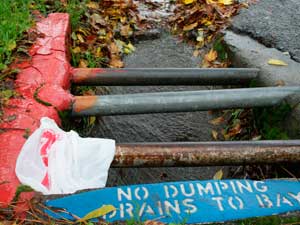| Marin Conservation League | 175 N. Redwood Dr., Ste. 135 | San Rafael CA 94903 | Tel 415.485.6257 | Fax 415.485.6259 Email Us. |
 |
Plastic Bags
 Considering how long it has taken for Marin County communities to ban plastic bags from grocery stores, one would expect a major celebration following Governor Brown’s signing of SB 270 into law on September 30, 2014. The idea of banning plastic grocery bags was soundly rejected by California lawmakers several times in the mid-2000s. In Marin County, it took five years for then-Supervisor Charles McGlashan to get the approval of the entire Board of Supervisors in early 2011. That decision was challenged in court by plastic bag interests because of the County’s failure to conduct an Environmental Impact Report comparing impacts of plastic bags with those of paper bags, so implementation was put off.
Considering how long it has taken for Marin County communities to ban plastic bags from grocery stores, one would expect a major celebration following Governor Brown’s signing of SB 270 into law on September 30, 2014. The idea of banning plastic grocery bags was soundly rejected by California lawmakers several times in the mid-2000s. In Marin County, it took five years for then-Supervisor Charles McGlashan to get the approval of the entire Board of Supervisors in early 2011. That decision was challenged in court by plastic bag interests because of the County’s failure to conduct an Environmental Impact Report comparing impacts of plastic bags with those of paper bags, so implementation was put off.
Meanwhile in 2009, Fairfax voters approved an initiative to ban plastic bags in. San Rafael’s then-Director of Community Development Bob Brown convened a broadly representative Single-Use Plastics Advisory Committee (SUPAC) in 2011, which met over a six-month period and recommended that an ordinance similar to the one adopted by the County be adopted by all Marin County jurisdictions. But the County’s unresolved legal challenge inhibited other Marin communities from enacting their own ordinances. It took another two years for the County to receive a favorable court opinion and begin implementing the ordinance in unincorporated Marin in January 2013. Other jurisdictions in the County slowly began to follow suit. At the State level, CAW pursued a new strategy, bolstered by data that more than 100 California municipalities that had instituted bag ban covering 35 percent of the state’s population.
The successful SB 270 legislation, authored by Los Angeles Sens. Padilla and de Leon, was co-authored by Assemblymember Marc Levine. The bill will prohibit grocery stores and large pharmacies from using plastic bags after July 1, 2015, and expand the ban to include convenience stores by 2016. The bill's passage was marked by compromise. The United Food and Commercial Workers Union gave their support only after the bill was amended to allow grocers to charge at least ten cents for reusable bags. For the plastics industry, the bill provides $2 million in loans and grants to help manufacturers retrain its workers and adapt to producing reusable bags. At the signing of the bill, Levine remarked: “Once again, California is leading the nation in environmental protection.”
MCL has a long history of supporting efforts to reduce waste and has adopted the following position statement:
1) MCL supports an overall countywide goal to reduce waste and waste in landfills.
2) MCL supports county and local jurisdiction policies that discourage single use carry out bags and encourages use of reusable bags.
3) MCL supports bag ban ordinances that either ban both plastic and paper bags or bans plastic bags and imposes a fee on paper bags that is sufficient to encourage reusable bags and significantly reduce the total amount of single use carry out bags provided to consumers.
Documents and Correspondence
- February 19, 2014 - Letter to Novato City Council re: disposable bag ordinance
- February 18, 2014 - Letter to San Rafael City Council re: disposable bag ordinance
- April 17, 2013 - Letter to Novato City Council supporting polystyrene food packaging ban
- March 18, 2013 - Letter to Novato City Council re: polystyrene food packaging ban on agenda
- September 7, 2012 - Letter to the San Rafael City Council re: polystyrene food packaging
- 2011 Draft Plastic Bag Ban Ordinance, County of Marin




